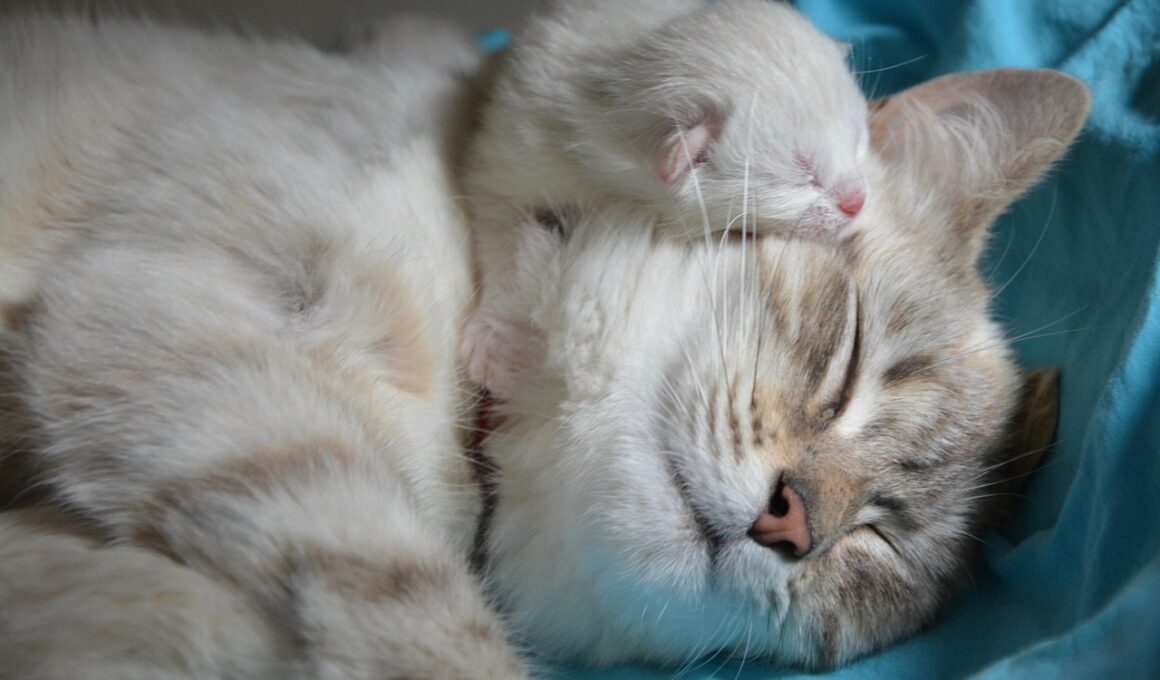Spotting Signs of Illness in Kittens Before Adoption
Selecting a healthy kitten is crucial, especially if you want to ensure its longevity and joy. When preparing to adopt, it’s essential to be cognizant of the potential signs of illness that can manifest in kittens. Early detection of trouble is key to a happy cat. Thoroughly examining a kitten can help prevent future health woes. First and foremost, ensure the eyes are bright and clear without discharge. Pay attention to the nose; it should be cool and moist. A dry or warm nose may indicate fever. Look for shiny, vibrant fur, free from bald patches or excessive dirt. Kittens should have a good level of energy and curiosity; a lethargic kitten may be unwell. Examine the ears; they should be clean and free from wax buildup. Always check if the kitten is willing to respond to gentle touch or sounds. Conducting a full-body examination for signs like swelling or unusual lumps is vital. Avoid rushing this process, as these initial observations can make all the difference in choosing a healthy kitten.
Understanding a kitten’s behavior is critical in recognizing potential health issues. Some illnesses do not exhibit visible external signs, yet their behavior may provide hints. A healthy kitten typically displays playful behavior, showing interest in their environment. Conversely, a kitten that is withdrawn, hides excessively, or shows little interest in play may be experiencing health problems. Watch for changes in appetite as well; a sudden lack of interest in food can be a significant warning sign. Ensure the kitten’s litter box habits are normal. Diarrhea or difficulty urinating should not be ignored. Additionally, monitor for any persistent coughing or sneezing. These symptoms can indicate respiratory issues that need medical attention. Listen closely to the kitten’s purring; if it’s irregular or accompanied by signs of distress, there may be an underlying issue. Flexibility in your approach enables you to capture more behavioral aspects leading you to a better understanding of the kitten’s health. Lastly, don’t hesitate to ask the current owner about the kitten’s health history. Transparency in this process aids significantly in making the best decision for your future feline friend.
Initial Health Checks
Once you’ve encountered a potential kitten, conducting initial health checks can delineate its wellness. Look closely at the kitten’s coat to assess overall hygiene and presence of parasites. A poor coat can point to nutritional deficiencies or parasites like fleas. Gently check the stomach area as well; a swollen belly might indicate worms or other health issues. The best approach here is to establish a comfortable connection with the kitten so it allows proper examination. Be sure to observe the kitten’s behavior around siblings, as social interactions can provide insights into its health. Look for kittens that engage positively with others. An overly aggressive or excessively timid kitten may possess underlying health issues or behavioral concerns. Remember to check their tiny teeth; they should be clean and without debris. Dental issues can arise early on, affecting both nutrition and overall health. Painful teeth might inhibit proper eating habits, which may contribute to further complications. After these checks, always make an informed decision on adopting by consulting an experienced veterinarian to further examine any concerns you may have uncovered.
Making your choice of kitten also involves being aware of breed-specific health issues that may arise. Some breeds are predisposed to specific health complications, and making thorough research is essential. For instance, Persian cats are prone to respiratory issues, while Maine Coons can suffer from hip dysplasia. A comprehensive understanding of the breed will help you recognize these potential health considerations. In any case, don’t hesitate to consult with breeders that maintain transparency regarding their feline lineage. Quality breeders often test for common genetic conditions which is essential for responsible breeding practices. Keep in mind that adopting a kitten from a shelter means you sometimes miss out on this vital information. Many shelters, however, provide early processing treatments that improve the kitten’s chances for a healthy start in life. Asking the staff about any known medical issues or preventive measures aids greatly in exposing health priorities. Regular vet check-ups should be part of your kitten’s new routine, ensuring close monitoring for any developing health problems. Furthermore, proper vaccinations from the shelter or breeder provide a solid beginning to your kitten’s life.
After Adoption Care
After bringing your new kitten home, providing proactive adjustments to its environment is key to a smooth transition. Establishing a safe and secure space for the kitten will help it adjust quickly while promoting its overall well-being. Introducing the kitten to different areas gradually allows it to familiarize itself and feel comfortable in its surroundings. While adjusting, observe any signs of stress or anxiety that may affect its health. An anxious kitten may show excessive grooming or unwillingness to eat. Therefore, you should create a soothing environment. Set up a hiding spot, like a soft bed or enclosed space, where the kitten can retreat if it feels overwhelmed. Playtime should also be frequent, using interactive toys to keep your kitten engaged and physically active, preventing behavioral issues in the future. Make sure the food and water dishes are accessible while initiating a routine feeding schedule. Consistency aids in establishing a healthy appetite. Monitor litter box habits for any changes post-adoption as well. Gradually using positive reinforcement can help create a lasting bond with your new furry friend.
In conclusion, spotting signs of illness before adopting a kitten necessitates mindfulness and careful assessment. Engage in thorough observation and understanding of feline behavior during your visit. Observe their vitality, energy levels, and response to human interaction. Ask questions to uncover any health history that may not be immediately apparent. Regular visits to the vet after adoption will ensure your kitten remains healthy and receives appropriate vaccinations. Keep an eye on their dietary needs, as what you feed plays a pivotal role in their development. Monitoring their social behavior will aid in recognizing any stress that could lead to illness later. Create a nurturing and accommodating living environment that protects your kitten from potential stressors. The goal is to promote positive behavior and reinforce trust and companionship. Finally, empower yourself with knowledge regarding various breeds to confidently navigate potential health risks. Each added layer of insight contributes to a responsible approach in your decision-making. With patience and dedication, your journey toward a happily ever after with your new furry friend can truly be fulfilling.
Final Thoughts on Healthy Kitten Selection
In summary, taking care while selecting a healthy kitten paves the way for a long-lasting companionship. Remember that the excitement of adopting rarely outweighs the responsibility it places on you as a pet owner. Emphasizing health needs should be your primary focus, even when falling in love with an adorable face. Utilize all the observations and resources available to you, including advice from veterinarians and experienced cat owners. Knowledge and attentiveness are your allies in this process. Prioritize a reputable source for your kitten adoption, whether through shelters, rescues, or reliable breeders. Always keep open communication, asking questions about any concerns that arise during your selection journey. When in doubt, never hesitate to seek medical guidance. Your role is to remain diligent in providing a healthy foundation for your new pet. With the right start, your kitten will flourish into a happy, active cat in no time. Following these steps is crucial in ensuring the well-being and happiness of your new furry addition, making a world of difference in the relationship you will build together.
Engaging in kitten care practices continues beyond the adoption phase. Investing time and effort towards a nurturing environment will enhance the quality of life for your new pet. Sticking to regular veterinary check-ups, vaccinations, and proactive health measures is essential for responsible cat ownership. Integrating play and socialization into your kitten’s daily routine should not be overlooked. Exploring various techniques to nurture healthy habits ensures your pet’s physical and mental enrichment. Research relevant information on the latest health care protocols to remain informed. In addition, establishing connections with local pet communities can offer support and shared experiences with fellow kitten owners. Such communities can be invaluable resources, whether online or offline, as you share knowledge, tips, and advice. Utilize these interactions to gain insights that further improve wellness for your new feline friend. Create a schedule for monitoring wellness benchmarks, including weight, behavior, and diet, consistently updating any practices if necessary. Consistency and a genuine commitment to understanding their needs create a loving bond that thrives over time. This way, you and your kitten will undoubtedly enjoy a fruitful and lasting companionship in your shared journey.


